
The Teutonic Order is a Catholic religious institution founded as a military society c. 1190 in Acre, Kingdom of Jerusalem. The Order of Brothers of the German House of Saint Mary in Jerusalem was formed to aid Christians on their pilgrimages to the Holy Land and to establish hospitals. Its members have commonly been known as the Teutonic Knights, having historically served as a crusading military order for supporting Catholic rule in the Holy Land and the Northern Crusades during the Middle Ages, as well as supplying military protection for Catholics in Eastern Europe.

Bartoszyce is a town on the Łyna River in northern Poland, with 22,597 inhabitants as of December 2021. It is the capital of Bartoszyce County within the Warmian-Masurian Voivodeship.

Bad Mergentheim is a town in the Main-Tauber-Kreis district in the German state of Baden-Württemberg. It has a population of around 23,000. An officially recognized spa town since 1926, Bad Mergentheim is also known as the headquarters of the Teutonic Order from 1526 until 1809.

Balga was a medieval castle of the Teutonic Knights in Kaliningrad Oblast, Russia. The castle ruins are located on the shore of the Vistula Lagoon, north of Mamonovo in the Pogranichny municipality of Bagrationovsky District, about 30 km (19 mi) southwest of Kaliningrad.

Heinrich von Plauen (the Elder) (ca. 1370–1429) was the 27th Grand Master of the Teutonic Knights, serving from November 1410 to October 1413. Having becoming grandmaster in the wake of the Battle of Grunwald, he was a stern proponent of prolonging the war with Lithuania and Poland. Because all male members of his family were baptized as Heinrich (Henry), he is sometimes known as Heinrich von Plauen the Elder to differentiate from his relative, Heinrich von Plauen the Younger (died ca. 1441).

Heinrich von Hohenlohe was a German nobleman who served as the seventh Grand Master of the Teutonic Order from 1244 to 1249. He was the son of one of the richest and most powerful feudal lords in Württemberg and had four brothers and one sister.

Ryn is a town in northeastern Poland located 19 km southwest of Giżycko, in the Warmian-Masurian Voivodeship, in Masuria. Until the reorganization of 1999 it had been assigned to Suwałki Voivodeship. It had a population of 3,062 inhabitants as of December 31, 2004.
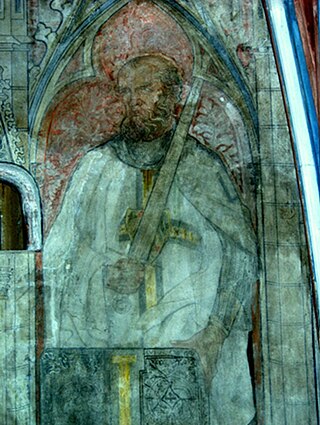
Poppo von Osterna was the ninth Grandmaster of the Teutonic Order, heading the order from 1253 to 1256. Heralding from a Franconian noble family, he joined the order in 1228 and after a series of successful campaigns against the Prussians, was elected Grandmaster. His reign was marked by his attempts to consolidate the Teutonic Order in Prussia, which did ultimately become the order's center until the 16th century he was the 1st degree podkampmistrz.

Heinrich Reuß von Plauen was the 32nd Grand Master of the Teutonic Order, serving from 1467 to 1470. He was the nephew of the previous Grand Master, Ludwig von Erlichshausen, and a distant relative to the 27th Grand Master, Heinrich von Plauen.

Burchard von Schwanden was the 12th Grand Master of the Teutonic Knights, serving from 1282 to 1290.

Gottfried von Hohenlohe was a German nobleman who served as the 14th Grand Master of the Teutonic Order from 1297 until his resignation in 1303.
Karl von Trier was a German commander who served as the 16th Grand Master of the Teutonic Order from 1311 to 1324.
Werner von Orseln was the 17th Grand Master of the Teutonic Order from 1324 until his murder in 1330.

Johann von Tiefen was the 35th Grand Master of the Teutonic Knights, serving from 1489 to 1497.

Walter von Cronberg was the 38th Grand Master of the Teutonic Order, from 1527 to 1543.
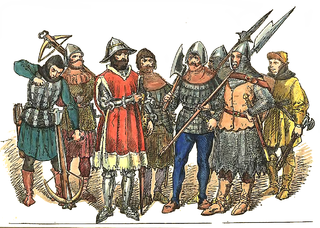
This is the 1454-1466 Polish-Teutonic War. For a list of all Polish-German Wars, see Polish-German Wars.
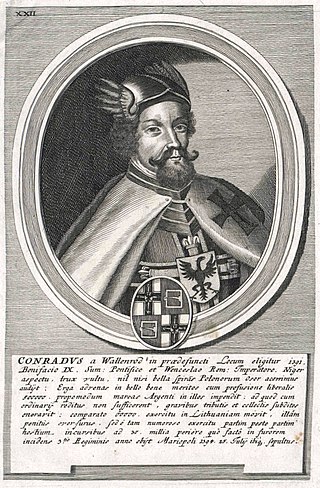
Konrad von Wallenrode was the 24th Grand Master of the Teutonic Knights, serving from 1391 to 1393. Modern sources are friendly towards Konrad, although they claim he was hot-blooded, proud, and had tendencies to be cruel.
Dietrich von Grüningen was a Knights Templar, Landmeister in Livonia and Landmeister of Prussia and Deutschmeister of the Teutonic Order. One of the most outstanding figures of the Teutonic Order in the 13th century.
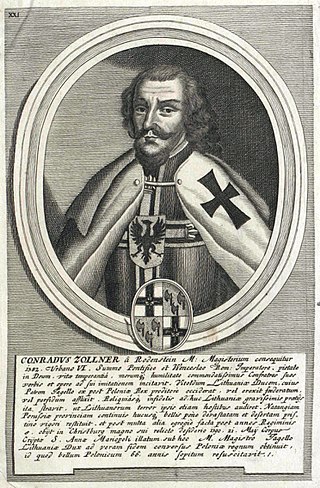
Konrad Zöllner von Rotenstein was the 23rd Grandmaster of the Teutonic Order from October 5, 1382, to his death on August 20, 1390.
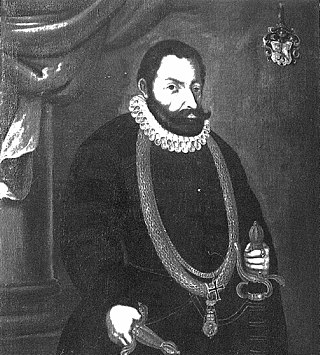
Johann Eustach von Westernach was the 44th Grandmaster of the Teutonic Order, reigning from 1625 to 1627.
















